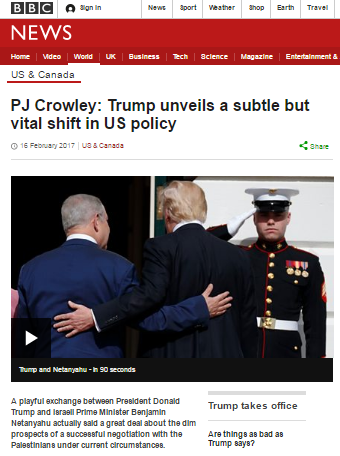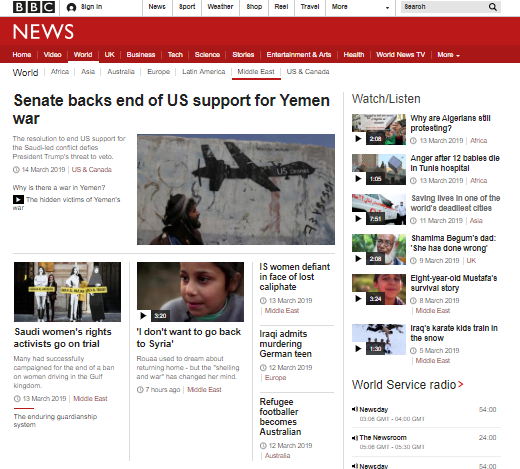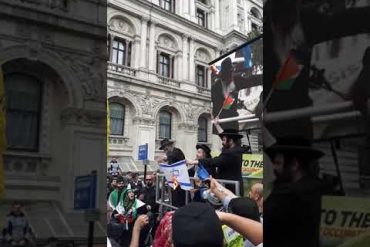The February 15th meeting between the US president and the Israeli prime minister in Washington DC saw the BBC vigorously promoting the theme of a “major policy shift” on the part of the US administration with regard to the two-state solution:
BBC News and the US ‘major policy shift’ that wasn’t
BBC Radio 4 amplifies PLO interpretation of the two-state solution
BBC WS continues promotion of two-state solution narrative
The next day – February 16th – the BBC News website published an article titled “Israel-Palestinian conflict: US ‘thinking outside box’” which included clarification from a senior official.
‘The US ambassador to the UN has said her country “absolutely” supports the idea of a two-state solution to the Israeli-Palestinian dispute.
But Nikki Haley also said the Trump administration was “thinking outside the box as well”, suggesting it was open to other possible solutions.
For many years, the US has advocated the establishment of a Palestinian state next to Israel.
But Mr Trump indicated on Wednesday he would not insist on that. […]
“We absolutely support the two-state solution but we are thinking out of the box as well,” Ms Haley said on Thursday, “which is – what does it take to bring these two sides to the table? what do we need to have them agree on?”‘
Despite that clarification, the BBC continued to push the theme of a ‘policy shift’ and on the same day published an article titled “PJ Crowley: Trump unveils a subtle but vital shift in US policy” on its website’s ‘US & Canada’ page as well as in the ‘features’ section of the website’s Middle East page where it has, at the time of writing, remained for eight consecutive days.
Ostensibly intended to help BBC audiences understand why the two-state solution has not been realised to date, the article states:
“A playful exchange between President Donald Trump and Israeli Prime Minister Benjamin Netanyahu actually said a great deal about the dim prospects of a successful negotiation with the Palestinians under current circumstances. […]
…the parties themselves are farther apart on the substance of the process – the borders of a Palestinian state, Israeli security arrangements within a Palestinian state, the right of return for Palestinian refugees and the status of Jerusalem – than they were at the end of the Clinton administration.”
Crowley’s ‘explanation’ of that situation begins with Israeli politics. Notably he entirely erases from his analysis the relevant issues of the Palestinian terror attacks that followed the Oslo Accords, half a decade of terror during the second Intifada and the rise in missile attacks that followed Israel’s disengagement from the Gaza Strip.
“The centre of Israeli politics has moved markedly to the right; the left that embraced the essential bargain of the Oslo process, land for peace, has receded.
The existing Israeli governing coalition is not wired to make concessions. In fact, it is pushing Mr Netanyahu to increase the settlement presence in the West Bank while accelerating construction in East Jerusalem.”
Readers are then told that:
“In 2009, the Obama administration demanded a freeze to all settlement activity. Israel reluctantly agreed, although some growth continued within settlements Israel would keep in any final deal.
Rather than accelerate negotiations, settlements became a bone of contention within them. When the 10-month settlement moratorium ended, so did direct negotiations.”
Once again Palestinian actions are erased from the portrayal given to BBC audiences. The article neglects to inform readers that the Palestinians refused to engage in negotiations throughout 90% of the ten-month long US dictated construction freeze declared at the end of November 2009. Only at the beginning of September 2010 did the Palestinians agree to commence direct negotiations and as the construction freeze’s pre-designated time frame drew to a close on September 26th, Abbas demanded its extension and threatened to end the talks if he did not get his way, with the result that on October 2nd 2010 the negotiations ended.
Next readers of this article are told that:
“Secretary of State John Kerry tried to achieve a framework agreement during Mr Obama’s second term, but his one-year effort fell short.”
That laconic sentence of course refers to the 2013/14 round of talks that came to an end after the Palestinians had opted to reject a framework proposed by the US, to join international agencies in breach of existing commitments and to opt for reconciliation with Hamas.
The article goes on to describe Israeli construction as a “fundamental problem” for the Palestinians without clarifying that prior to Obama’s 2009 insistence on a construction freeze, they were perfectly able to conduct negotiations on numerous occasions even though building was ongoing at the time.
“Mr Netanyahu may moderate the current pace of settlement activity but he is not going to stop it. The Palestinians will continue to see settlement activity as a fundamental problem.”
The pertinent issue of the Hamas-Fatah split is addressed in this article as follows:
“The Palestinians are deeply divided. In 2006, Hamas won an unexpected majority of seats in the Palestinian legislature over Mr Abbas’ Fatah Party. The Palestinians have lacked political unity ever since.
Today, Hamas, not the Palestinian Authority, is the de facto government in Gaza. Full elections have not been held in more than a decade.”
However, the fact that Hamas is not a member of the body – the PLO – that conducts negotiations with Israel is not clarified and neither is the very relevant fact that Hamas rejects the two-state solution or that Fatah rejects one of its basic requirements: recognition of Israel as the Jewish state.
Recent weeks have seen a dramatic spike in the amount of content produced by the BBC relating directly or indirectly to the topic of the two-state solution and the ‘peace process’ in general.
In common with most of that content, this article once again fails to give BBC audiences the full range of information needed to enhance their understanding of why negotiations between Israel and the PLO have yet to bear fruit. Palestinian actions, choices, policies and decisions are erased from view while the story is framed as being about a “moribund”, “fading” two-state solution which is endangered primarily by Israeli construction and – lately – by a supposed “shift” in US policy.
Clearly that framing is not the result of an aspiration to meet the BBC’s public purpose remit but by the drive to promote a politically motivated narrative.
Related Articles:
Examining the BBC’s claim that Israeli building endangers the two state solution




